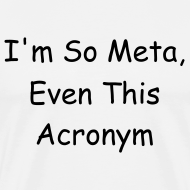Course Description
From the Course Catalog: “An advanced writing course that builds upon the critical thinking, reading, and writing processes introduced in English 1A, 2, 5, or 10/11. This class emphasizes rhetorical awareness by exploring reading and writing within diverse academic contexts with a focus on the situational nature of the standards, values, habits, conventions, and products of composition…”Oh, wow, are you asleep yet?
Look, I’m going to drop the academic tone for a second here. Don’t get me wrong, I like academic writing, and I sincerely hope you develop enthusiasm for the work we do in this class, but I don’t think all of my students are as into the “situational nature of the standards” as I am. And that's fine. You don't need to be enthusiastic about composition to get at the purpose of this course.
I’ll admit, this attempt at straight talk in a syllabus is a ploy. I’m breaking the rule of a familiar genre in an attempt to establish my voice, generate a rapport, and deal with the elephant in the room: A lot of my students would not be in my class were it not for a university requirement. In my discipline, this kind of obstacle is referred to as a constraint – a factor that makes it difficult to achieve my goal.
And what is my goal here? I’m going to answer that in this paragraph, but before I do, you should try and answer the question. Take your time. Got an answer? Okay. Here’s my purpose: I want this section of the syllabus to introduce the goals of this course and then demonstrate the methods we’ll use to achieve those goals. So, how’d you do? Do our answers match? If so, why do you think that is. If not, why? That was your first course activity. Achievement unlocked!
 So, we’re going to examine how writing does the things it does. More specifically, we’re going to look at the things writing needs to do as you work on general education requirements and courses for your major.
So, we’re going to examine how writing does the things it does. More specifically, we’re going to look at the things writing needs to do as you work on general education requirements and courses for your major.Back to the catalog: “Students will research and analyze different disciplinary genres, purposes, and audiences with the goals of understanding how to appropriately shape their writing for different readers and demonstrating this understanding through various written products.”


